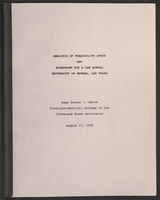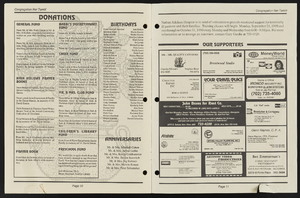Search the Special Collections and Archives Portal
Search Results

Transcript of interview with Sandra Peña by Lada Mead and Stefani Evans, March 27, 2017
Date
Archival Collection
Description
Sandra Peña’s story begins in East Los Angeles, where she spent her first fifteen years with her parents (both from Michoacán, Mexico), and her younger sister. The father's managerial position at Master Products allowed the family to live rent-free in a company-owned house behind the main factory, because he collected the rents for the company's two other dwellings. In this interview, Peña recalls the family move to Porterville, in California's Central Valley, her return to Los Angeles at nineteen, and her work with Parson’s Dillingham, a contractor for the Metrolink rail system. She draws the link between the Los Angeles and Las Vegas construction communities by describing her husband's move to Las Vegas to find work; a chance Las Vegas encounter with a friend from Chino, California; her ability to gain employment in Las Vegas at Parson’s, a company that had joint ventured with Parson’s Dillingham, and her move from there to Richardson Construction, a local minority-owned company. As Peña says, "It's kind of all intermingled. Even if you go here and you go there, it's like everybody knows everybody." Throughout, Peña weaves her family story into the narrative as she describes her youth, the birth of her son, the illness and death of her father, and her family's participation in her current employment with Richardson. As she remembers the people, places, and events of her life, Peña speaks to the ways one woman of color built on her interstate construction connections and rose in a male-dominated industry.
Text

Transcript of interview with Joy Snyder by Lisa Gioia-Acres, December 17, 2009
Date
Archival Collection
Description
Joy Snyder, born and raised in Pennsylvania, is the daughter of Jean Dasinto and stepdaughter of Ray Hunt. Though she was raised thinking she was an only child, she shares that as an adult, she was contacted by an aunt who gave her information about an Austrian half-sister. The half-sister had tracked the family through WWII records on her biological father! Joy was raised in a very large extended Italian family (her maternal grandmother was first-generation Italian) and became the first in her family to attend college. She had decided early on that she wanted to be a nurse and chose to attend Temple University Hospital in Philadelphia. She recounts memories of her earliest work there, which began the first week of school. After graduation from nursing school, Joy married her childhood sweetheart, William (Bill) Snyder. They made the move to Las Vegas in 1978 and Joy found work right away at Desert Springs Hospital. She worked there about six months and then took maternity leave after the birth of their second son. When she returned to work, it was at Sunrise Hospital (early 1979) in the newborn nursery. Joy comments on many aspects of her career, including the informal approach to health care, the effects of desert climate on mothers and newborns, and the changes she has seen at Sunrise Hospital. She also comments on adoption practices in Las Vegas, drug-addicted babies, and cultural attitudes that appear during the birthing process. Today Joy is retired and her husband Bill is close to retiring. They feel a strong connection to Las Vegas (Bill has a school named after him), but maintain a second home in New York for their trips back East to visit friends and family. They also keep up with various community activities, including book clubs and running clubs for the children at William Snyder Elementary School.
Text

University of Nevada, Las Vegas law school feasibility studies
Date
Archival Collection
Description
Folder contains a study titled "Analysis of Feasibility Study and Blueprint for a Law School, University of Nevada, Las Vegas" by Steven R. Smith, Cleveland-Marshall College of Law, Cleveland State University, August 17,1990 and a second study titled "A Feasibility Study for a Law School at the University of Nevada, Las Vegas" prepared by R. Keith Schwer, PhD, Director, The Center for Business and Economic Research, University of Nevada, Las Vegas, May 29, 1996. From the University of Nevada, Las Vegas William S. Boyd School of Law Records (UA-00048).
Text

Transcript of interview with George Pollak by Claytee White, May 25, 2010
Date
Archival Collection
Description
George was raised in Mattapan, a suburb of Boston, by his mother and father. George had four siblings and was the second youngest. George shares fond memories of growing up and playing softball and tennis in the neighborhood park with his numerous friends. George could listen to a song on the radio and play it on the piano by ear when he was as young as four years old. George had several jobs to earn money growing up, including working in a record store and as a busboy. Eventually George and his brother joined a trio with Steve Harrington and performed in clubs. In 1958, George joined his brother and Paulette Richards in Las Vegas where they had a contract to play at El Rancho Hotel & Casino where they played until it was destroyed by fire. Following the fire, George and his brother parted ways and each did their own thing. In the 1960s, George began playing with the band at Caesars Palace. George used his background in accounting to do some bookkeeping and payroll for some of the ban
Text

Transcript of interview with Dayvid Figler by Barbara Tabach, June 22, 2016
Date
Archival Collection
Description
Dayvid Figler (1967 - ) is the quiet boy who became an insightful and creative contributor to the local culture of Las Vegas. The oldest of Barbara and Meyer Figler?s three children, he was four years old when the family station wagon reached Las Vegas in 1971. They moved in with Uncle Izzy (aka Big Irish) Figler for a few months. Having the ?juice,? Dayvid?s father soon became a Pan dealer on the Strip. As the family grew, Barbara eventually immersed her energies in her children?s activities, Hadassah and Temple Beth Sholom. In this oral history, Dayvid also recalls his awkward, but incredibly interesting youth, his bar mitzvah at Temple Beth Sholom, and path to a successful career as a criminal defense attorney. He also talks about embracing Las Vegas as his home, owning a home in John S. Park neighborhood and mentions a number of literary depictions of Las Vegas that he admires. Dayvid describes growing up a ?casino kid? who lived in an apartment near the Riviera Hotel. This, in addition to his slight stature and academic brilliance, may have set him apart from many of his childhood peers. He graduated from Valley High School at the age of 16 and by the age of 23 he was a rising star in the legal world. He looks back with appreciation to his list of mentors who encouraged him along the way. Dayvid is also a local favorite as an essayist and poet. For a number of years he could be heard on KNPR/NPR. He has been a performer in hundreds of productions that featured his comic wit and writings, from Lollapalooza to Tom and Jerry?s on Maryland Parkway.
Text

Transcript of interview with Renee Diamond by Barbara Tabach, November 20, 2014
Date
Archival Collection
Description
In this interview, Renee Diamond discusses coming to Las Vegas via Los Angeles, with her husband and children in the 1970s and getting involved in politics. She talks about her husband, Leo, and his business selling vinyl records in L.A., and her work in a doctor's office. Once in Las Vegas, the Diamonds joined Temple Beth Sholom and later Congregation Ner Tamid. Renee talks about her involvement in the political arena in southern Nevada, including the League of Women Voters.
Community activism and social justice rank high in the legacy of Renee Diamond. She often refers to herself as one of the last of the generation without college degrees that could make a difference in the politics of the state. When Renee, her husband Leo Diamond moved their family to Las Vegas from southern California, the energetic advocate Renee quickly plugged into the community. The word "No" was not part of her vocabulary. Among the many Jewish and secular activities the she engaged in were: the editorial board of the Jewish Reporter newspaper; Hadassah; Anti-Defamation League; Red Cross Board; State Museum Board to name a few. She remains a vibrant Democratic Party leader and served one term on the Nevada Assembly in 1989. She was on the front lines as a fierce and active supporter of Welfare Rights, Fair Housing and the Equal Rights Amendment. It is a life that included working alongside illustrious women and men of Southern Nevada history. A list that includes: Harriet Trudell, Ruby Duncan, Myrna Williams and Dorothy Eisenberg and many more mentioned here. Meanwhile she raised four children and enjoyed a loving 43-year marriage with Leo (aka "Uncle Leo") whose career included the popular Bingo Palace, Slots-A-Fun and Stations Casinos. During this oral history interview she recalls the Las Vegas that she moved to in 1972 and reflects on what attracted people here, ways to be part of the Jewish life which might even include a bowling league and how involvement in raising social awareness was a worthy investment of ones' time. This is a look at a woman who made a difference.
Text

Interview with Leslie Ray Hill, February 17, 2006
Date
Archival Collection
Description
Text



